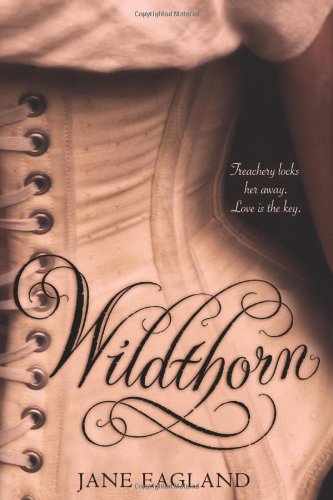Today I would like to discuss a recent YA historical fiction by Jane Eagland, titled Wildthorn.
Statistics
Checkouts: Not owned by the school
Typical reader: Teens and young adult women
Synopsis: Louisa Cosgrove just wanted to become a doctor like her father. Instead, she finds herself locked away in an asylum called Wildthorn Hall, stripped of her dignity and name. How did she come to be here? Will she ever be free?
My Goodreads rating: 4 stars
This novel is set in Victorian England, when young women were supposed to be content with learning no more than what was needed for being a good wife and mother, and were supposed to be happy with that lot in life. However, it was also the time of Florence Nightengale, and the period that saw the first medical schools for women opening in place like London.
This book is the story of Louisa Cosgrove, a 17-year-old young lady who has her sights set on becoming a doctor like her father. Through the bolded, past-tense narratives, we learn about her childhood, her friendship with her cousin Grace, and her idolization of her father. However, they also show us the loss of her father to typhoid and what happens to her dreams after his passing. These are intermixed with sections of present-tense prose as Louisa is taken to Wildthorn Hall, an asylum, where she is given a new identity and cruel treatment. She tries to piece together what happened. Was she kidnapped? Did someone in her family commit her?
That's the first part of the novel. After that, with the knowledge of how she came to be at the asylum, she copes with the awful life within its walls and dreams of escaping. Can she? Will the friendly young staff member named Eliza help her?
Ms. Eagland did her research into the lives of women incarcerated in asylums in nineteenth century England, and it shows. This wonderfully paced novel is full of evidence of how awful those institutions were - and how many women within them were not crazy, but merely unwanted by their families. Other women were committed by well-meaning families who didn't realize that they were only shown the best living areas, and had no idea what their wives, daughters, sisters, and nieces really experienced.
Louisa is a strong narrator throughout. Her spirit is nearly broken by the horrors she lives through in Wildthorn Hall, but perseveres. She remains a lady of fine bearing even when she is able to face the truths of what brought her to the terrible place. Through her eyes we also meet several supporting cast members, to be loved or reviled, or to even be shocked by.
Edited to add: This book really triggered a lot of emotions for me. You can really get angry, even furious, at what happens to Louisa, and at those who betrayed her trust. Parts brought tears to my eyes as well. Kudos to the author for writing something that can strike such strong emotion.
The romance is what drops this otherwise excellent book down to 4 stars rather than a full 5. I felt that it detracted from the force of the story. This novel won the Lambda Literary Foundation Award for LGBT Children's/Young Adult (2011). As you might surmise from that, Louisa falls in love with another woman. Here are my problems with that. First, the only men in the story of any circumstance are Louisa's brother and father (and occasionally the owner of the asylum); she has only women to interact with. If it were not for the occasional kiss, her relationships with other ladies would have all been warmly platonic and nothing more. It came across as though the author needed to work in some romance to the story, and since Louisa was surrounded by women, well, she had to love a woman. Second, it comes across as a stereotype. Louisa is a willful tomboy who wants to pursue a man's profession. Therefore, she -must- be a lesbian! ... What?
I hope that doesn't come across as being anti-lesbian. Truthfully, I picked up the book because it won that award. Coming-of-age stories with the extra struggle of being different are very appealing, and these days, being different is typically a matter of orientation. But this book didn't need it.
This is, save for the romance (I could have done without the epilogue), a very good historical fiction that offers both a strong heroine and a hard look at the treatment of women and the social problems that were asylums in the late nineteenth century.

interesting comment. Perhaps if she had met a nice man it might have been different? who knows?
ReplyDeleteI liked this book as well. I couldn't help but feel so angry for her because of the way she was treated just because she didn't act like a proper Victorian lady.
Tom needs to die..I hate that SOB with a passion... XD
It's good to know that the unnecessary addition of the romance didn't ruin the book for you, because it sounds like a convincing, harrowing read overall.
ReplyDeleteAlso, "Yay for YA" is a great title for a column. :)
To okbolover - Thank you for mentioning your anger! I forgot to include how emotional this book made me.
ReplyDeleteSo this is a little out of place but since I'm lurking on here.... :P I think you need to participate in this: http://www.worldbooknight.org/your-books/the-wbn-top-100-books. I haven't put my list together yet, but I'm curious what yours and the boyo's is :)
ReplyDelete